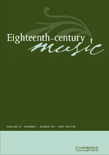
Eighteenth-Century Music
Scope & Guideline
Engaging with the Rhythms of Cultural Evolution
Introduction
Aims and Scopes
- Historical Contextualization:
The journal emphasizes the importance of situating music within its historical context, examining how social, political, and cultural factors influenced musical practices and compositions during the 18th century. - Interdisciplinary Approaches:
Eighteenth-Century Music encourages interdisciplinary research that bridges musicology with other fields such as history, literature, and cultural studies, allowing for a more comprehensive understanding of the period's music. - Analysis of Musical Forms and Styles:
The journal regularly publishes analyses of various musical forms and styles prevalent in the 18th century, including opera, symphonies, and chamber music, focusing on compositional techniques and aesthetics. - Exploration of Lesser-Known Composers and Works:
A distinctive feature of the journal is its commitment to uncovering and showcasing the works of lesser-known composers, thus broadening the canon of 18th-century music beyond the well-trodden paths of Mozart and Haydn. - Cultural Identity and Reception:
The journal explores themes of cultural identity and the reception of music across different regions, emphasizing how local traditions and influences shaped the music of the 18th century.
Trending and Emerging
- Cultural Exchange and Global Perspectives:
Recent articles highlight the interactions between European music and various global traditions, particularly through colonial contexts, which are becoming increasingly important in understanding the broader musical landscape of the 18th century. - Intersections of Music and Identity:
There is a growing focus on how music relates to issues of identity, including gender, ethnicity, and class, suggesting an emerging trend of examining music as a vehicle for expressing and negotiating personal and collective identities. - Digital Humanities and Archival Research:
The incorporation of digital tools and methodologies in music research is on the rise, with an emphasis on utilizing digital archives and databases to enhance the accessibility and study of 18th-century music. - Reassessment of Canonical Works:
A trend towards re-evaluating and reinterpreting canonical works, particularly those of well-known composers like Mozart and Haydn, is evident, as scholars seek to uncover new meanings and contexts for understanding these compositions.
Declining or Waning
- Traditional Biographical Studies:
There has been a noticeable decrease in the publication of traditional biographical studies focused solely on prominent composers, suggesting a shift towards more thematic and contextual analyses rather than individual narratives. - Performance Practice Studies:
Research specifically centered on historical performance practices, while still relevant, appears to be less frequently featured, indicating a possible waning interest in this area compared to broader theoretical and analytical perspectives. - Focus on Music Theory:
The scope of papers dedicated to solely theoretical discussions of music from the 18th century seems to be declining, as the journal appears to favor research that integrates theory with historical context or cultural studies.
Similar Journals

RIVISTA ITALIANA DI MUSICOLOGIA
Connecting Scholars Through the Language of MusicRIVISTA ITALIANA DI MUSICOLOGIA, published by the Italian Society of Musicology, is a distinguished journal dedicated to the field of musicology, offering a platform for scholarly research and discourse on a wide array of musical topics. With an ISSN of 0035-6867 and an E-ISSN of 2036-5586, this journal has contributed significantly to the understanding of music in cultural and historical contexts. Although the scope of coverage was marked from 2003 to 2008 in renowned databases like Scopus, the journal continues to serve as an invaluable resource for researchers, educators, and students embroiled in music studies. Its emphasis on rigorous research and critical analysis makes it a vital asset for anyone seeking to deepen their knowledge of musicological inquiry. While not an open-access publication, the RIVISTA ITALIANA DI MUSICOLOGIA remains a prestigious outlet for scholarly contributions that reach audiences eager to explore the complexities of musical heritage.
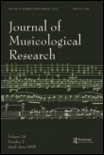
JOURNAL OF MUSICOLOGICAL RESEARCH
Unveiling the Rich Tapestry of Musical ResearchJOURNAL OF MUSICOLOGICAL RESEARCH, published by Taylor & Francis Ltd, is an esteemed platform that delves into the field of musicology, contributing to the ongoing dialogue in music research and scholarship since its establishment in 1979. With an ISSN of 0141-1896 and an E-ISSN of 1547-7304, this journal serves as a vital resource for researchers, professionals, and students, offering insights into diverse musicological topics. Although currently categorized in Q4 in Music with Scopus rankings placing it at #110 out of 180 in the Arts and Humanities field, its commitment to excellence and broader discourses in music studies is evident. The journal does not have Open Access options, yet it provides accessible content through reputable academic channels, fostering scholarly exchanges within the community. It aims to publish high-quality research that advances understanding of musical practices and cultural implications, making it a critical resource for those passionate about music and its myriad influences.

Muzikoloski Zbornik
Elevating Musicology to New HeightsMuzikoloski Zbornik is a prominent open-access journal in the field of musicology, published by the esteemed University of Ljubljana Press since 1965. Hailing from Slovenia, this journal has been dedicated to advancing the study of musical heritage, theory, and practice, serving as a vital platform for researchers, professionals, and students alike. With a notable Q2 category ranking in the field of music and a Scopus ranking of 109 out of 180 in Arts and Humanities, Muzikoloski Zbornik showcases high-quality research, fostering discourse and collaboration among scholars globally. The journal embraces a diverse range of topics, from ethnomusicology to music education, ensuring its relevance in an ever-evolving academic landscape. By providing unrestricted access to its content, it champions the dissemination of knowledge and supports the growth of the musicology discipline.

FONTES ARTIS MUSICAE
Contributing to a rich legacy of music scholarship.FONTES ARTIS MUSICAE, with ISSN 0015-6191 and E-ISSN 2471-156X, is a distinguished journal published by A-R EDITIONS, specializing in the fields of Music and Library and Information Sciences. Established in the United States, this journal serves as a vital resource for scholars, practitioners, and students engaged in the exploration and analysis of music and its associated disciplines. With an established converged publication history from 2002 to 2024, FONTES ARTIS MUSICAE has consistently contributed to the discourse within its scope, reflected in its current quartile rankings of Q4 in Library and Information Sciences and Q3 in Music for 2023. Although not an open-access journal, it offers essential insights and research findings, appealing to a diverse academic audience. Its position within the 18th percentile of the Arts and Humanities (Music) category and 11th percentile in Library and Information Sciences underscores its growing significance in these fields, making it a critical platform for advancing knowledge and fostering collaboration.
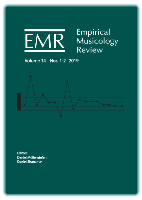
Empirical Musicology Review
Bridging Theory and Practice: Where Musicology Meets MethodologyEmpirical Musicology Review is a pioneering journal in the field of musicology, published by the Ohio State University School of Music. Established as an open access journal since 2006, it aims to foster interdisciplinary research by providing a platform for scholars to disseminate empirical studies and analyses related to music. With ISSN 1559-5749, this journal plays a crucial role in expanding the understanding of music through methodological rigor and innovative practices, catering to researchers, professionals, and students alike. By promoting the accessibility of high-quality research, Empirical Musicology Review significantly contributes to the evolving landscape of music studies and enhances the global dialogue surrounding music's theoretical and practical dimensions. The journal's commitment to open access ensures that its valuable insights reach a broad audience, encouraging further exploration and collaboration within the musicology community.
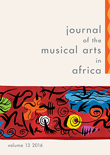
Journal of the Musical Arts in Africa
Exploring the Rhythms of Cultural IdentityThe Journal of the Musical Arts in Africa is a premier academic publication dedicated to exploring the rich and diverse musical traditions of the African continent. Published by ROUTLEDGE JOURNALS, TAYLOR & FRANCIS LTD, this journal offers a vital platform for researchers, professionals, and students in the field of musicology. With an ISSN of 1812-1004 and E-ISSN of 2070-626X, the journal has established itself as a significant contributor to the scholarly discourse surrounding African musical practices. With an impact factor reflecting its growing influence, the Journal of the Musical Arts in Africa is categorized in the Q3 quartile of music journals according to the latest metrics, placing it among an essential cadre of publications in the field. The journal invites original research articles, reviews, and critical essays that aim to expand the understanding of music as an integral part of African culture. It has been continuously publishing since 2004 and encompasses a wide range of topics, making it a must-read for anyone interested in the intersections of music, culture, and identity on the African continent. The journal stands as a testament to the vibrant musical heritage of Africa and encourages scholarly contributions that highlight the importance of music in reflecting and shaping societal values.

HUDEBNI VEDA
Celebrating the Art and Science of MusicHUDEBNI VEDA is a distinguished journal published by the Czech Academy of Sciences Press, specializing in the field of music. With its ISSN 0018-7003 and E-ISSN 2694-6998, this journal serves as a vital platform for scholarly communication in music studies, promoting innovative research and critical discourse. Since its inception in 2002 and scheduled for continuation until 2024, it has emerged as a respected publication within the music academic community, though currently holding a Category Quartiles ranking of Q4 in Music. Notably, it ranks #127 out of 180 in the Scopus Arts and Humanities - Music category, placing it in the 29th percentile. While it operates under traditional access constraints, HUDEBNI VEDA is committed to fostering an inclusive academic environment, inviting contributions that push the boundaries of musicology. This journal is essential for researchers, professionals, and students eager to explore and engage with contemporary issues and developments in the study of music.

MUSIK IN BAYERN
Illuminating the Harmonies of Bavarian LifeMUSIK IN BAYERN is a distinguished journal devoted to the study of music within the rich cultural context of Bavaria, published by HANS SCHNEIDER. With the ISSN 0937-583X, this publication serves as an essential resource for researchers, professionals, and students interested in the historical and contemporary musical landscape of the region. Spanning topics from traditional Bavarian folk music to modern interpretations, the journal aims to foster a deeper understanding and appreciation of Bavarian music in a global context. Although the journal's coverage in Scopus has been discontinued, it remains an essential platform for scholarly communication and analysis in music studies. While MUSIK IN BAYERN operates under a subscription model, it continues to hold significance as an intellectual resource for advancing research in musicology.
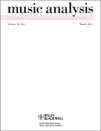
MUSIC ANALYSIS
Deciphering the Language of Music through AnalysisMUSIC ANALYSIS, published by WILEY, is a prestigious journal in the field of musicology, recognized for its critical contributions to the analysis of music and its myriad influences on culture and society. With an ISSN of 0262-5245 and an E-ISSN of 1468-2249, this journal has established itself as a vital resource for researchers, professionals, and students alike, boasting a Q1 ranking in the 2023 category of Music. As part of a highly competitive field, it ranks 70th out of 180 in the Arts and Humanities Music category on Scopus, positioning it within the 61st percentile. MUSIC ANALYSIS serves as an essential platform for innovative research and insightful discourse, engaging with musical theory, practice, and education from 1996 to 2024. Its commitment to fostering rigorous scholarship makes it indispensable for those seeking to deepen their understanding of music and its analytical frameworks. Although it does not offer Open Access options, its relevance and impact in the genre ensure accessibility through institutional subscriptions and university libraries.

Studi Musicali-Nuova Serie
Unveiling New Perspectives in MusicologyStudi Musicali-Nuova Serie is a distinguished academic journal dedicated to the field of musicology, published by the esteemed ACCAD NAZ SANTA CECILIA, FONDAZIONE. This journal serves as a platform for the dissemination of cutting-edge research and scholarly discourse surrounding various aspects of music, including historical, theoretical, and applied music studies. While the journal has contributed significantly to the field with its publication span from 2002 to 2009, it has since been recognized for its rigorous academic standards and its role in advancing knowledge in musicology. Despite its coverage being discontinued in Scopus, it continues to hold relevance among researchers, professionals, and students interested in the rich and diverse world of music. Situated in the heart of Rome, at the AUDITORIUM PARCO DELLA MUSICA, this journal embodies the vibrant cultural heritage of Italy while fostering international academic collaboration in music studies.